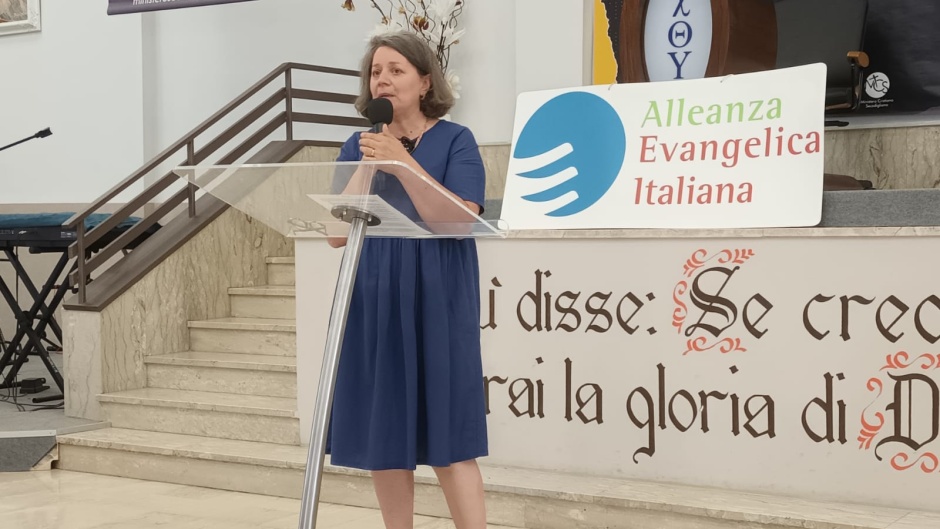Italian Evangelical Alliance on abuse, refugees and Roman Catholicism
The AEI federal assembly presented its annual report and its upcoming projects of a humanitarian corridor for Afghan refugees and a protocol to fight abuse.
Italian Evangelical Alliance · NAPLES · 30 MAY 2022 · 21:45 CET

The federal assembly of the Italian Evangelical Alliance (AEI) was held on 28 May at the Evangelical Pentecostal Church Christian Ministry Secondigliano, in the Italian city of Naples.
The pastor of that church, Christian Parisi, welcomed the participants of the meeting, which was led by Lucia Stelluti, Vice President of AEI.
Giacomo Ciccone, president of the AEI, presented the annual report with an account of the activities of the Alliance during 2021, a year “still marked by the impact of the pandemic”, but important dates such as the International Week of Prayer, Mission Sunday, Refugee Sunday, Remembrance Sunday and the International Day of Prayer for the Persecuted Church – IDOP).
Furthermore, “the reports of the districts highlighted both the vitality of the Alliance and the critical issues faced by the evangelical body”. New initiatives were also presented, such as the Reformation Walk in Naples, which aims to enhance the memory of the evangelical movement in Naples through a walk tour in the historic centre.
At the end of the assembly, pastor Michele Romeo preached from the book of Ezekiel, recalling “the challenge of living in a time of crisis, while receiving the Word of God and bearing witness of it, with the certainty of having the Lord's hand upon us”, reported the AEI.
Humanitarian corridor project
During the AEI Assembly, President Ciccone talked about the humanitarian corridor project that AEI is activating to welcome in Italy around seventy Afghan believers who have fled their country following the seizure of power by the Taliban.
According to the AEI, “this is a project in which AEI is collaborating with Italian institutions and a number of evangelical NGOs dedicated to assisting Christians in need. Dozens of evangelical churches and organisations have also expressed their willingness to cooperate on fundraising”.
Valeria Marzano stressed that “the responsibility of hospitality should not be motivated only by the emotions, but rather take on the royal, prophetic and priestly aspects characteristic of the Christian vocation. The aim is not only to manage an emergency, but to put in place a medium-term initiative for the integration of the people”.

Fighting abuse
The AEI also reported that they have been reflecting on the subject of abuse in the churches for some time now.
Giuseppe Rizza, coordinator of the Northeast District, pointed out that the AEI is drafting a document based on the work of the French National Council of Evangelicals (CNEF) to be proposed to the Italian evangelical churches as a platform for reflection and a protocol to be adopted to prevent abuse and deal with it.
Carine Francq emphasised that churches should not be places of silence, under the illusion that they are safeguarding witness. She warned that the churches still deals with it with superficiality and poor preventive measures. “The AEI is committed to being a place for all evangelicals to work on this issue”, she said.
Roman Catholicism
After the lunch break, the AEI Federal Assembly concluded with a panel discussion on the evangelical analysis of Roman Catholicism with Leonardo De Chirico, Giacomo Ciccone, and Pastor Michele Passaretti.
For this occasion, De Chirico presented his book, Same Words, Different Worlds. Do Catholics and Evangelicals believe the same gospel?
The panellists recalled the document 'Italian Evangelicals on Roman Catholicism' (2014), which “marked a unique moment in contemporary evangelical history with the main Italian evangelical denominations signing a joint document reaffirming the historical position of evangelicals on Catholicism'”.
“The Roman Catholic church, although it is changing in some of its components, remains anchored to its unbiblical beliefs and practices and is therefore not susceptible to any relationship marked by spiritual 'unity'”, stated the document.
President Ciccone also recalled another AEI document called Covenant and co-belligerence: When is it biblically right to collaborate? (2011), which clearly distinguishes the evangelical openness to collaboration with different parties on specific issues of common ethical and social concern from the unity among born-again believers that is expressed through prayer and common mission. Evangelicals should be able to co-belligerate with the Roman Catholic Church, but not unite spiritually with it.
Pastor Passaretti called for a wide circulation of the book Same Words, Different Worlds, because the topic “is of national and global importance and because the challenges of today's evangelical witness require evangelical clarity in order not to be confused by the complexity of religious issues”.
Published in: Evangelical Focus - europe - Italian Evangelical Alliance on abuse, refugees and Roman Catholicism
